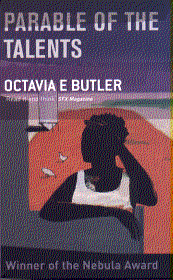On-line Response #5: Octavia BUTLER & Kathy ACKER
Review the material below, and respond to any of the questions that follow.

OCTAVIA ESTELLE BUTLER & THE GENRE OF SCIENCE FICTION
Or, how a writer can go from a sociological ghetto to a literary ghetto…
For starters, consider the following definitions from Dictionary.com:
"Genre: A category of artistic composition, as in music or literature, marked by a distinctive style, form, or content..."
"Subgenre: A subcategory within a particular genre: The academic mystery is a subgenre of the mystery novel."
The designation of genres can also reveal critical bias, as the following generally are not included in bookstore “literature” sections, which sometimes suggests their inferiority to “literature”: horror, mystery thrillers, westerns, romances, fantasy, and of course science fiction. As you know, some authors can be considered “horror” writers, and yet their work takes on literary significance that is subsequently canonized by the academics who compile anthologies – think, here, of Edgar Allan Poe.
Consider, also, if Stephen King will some day move out of the “Horror” section into “Literature”, and if his works (horror, fantasy, and the lot) will end up on college literature syllabi.
Textual Connections
A. The Genre – SciFi’s popularity in American culture took on special significance in the post-Atomic era, especially with displaced images of conquest, technological advancement, and inter-planetary conflict. Prior to this, even English writer H.G. Wells’ The War of the Worlds (1898) projected a displaced fear of colonial conquest from the British experience of empire. Our fears of Atomic decimation, Soviet domination, and technology run amok find expression in many popular examples of science fiction written for mass consumption, much of it produced as pulpy hack writing. And even now, writers like Michael Crichton (Jurassic Park) create stories for mass audiences based in late-20th century techno-fear.
B. Experiments with the Genre – William S. Burroughs demonstrates in Naked Lunch a wild imagination that takes the reader to fantastic and exotic worlds. In this, it is much like Jonathan Swift’s Gulliver’s Travels (1726) -- both, by the way, are satires -- or even like the fantasy quests of The Lord of the Rings trilogy. But some of Burroughs' work has been considered visionary for his science-fiction-esque settings and its influence on such renowned literary sci-fi writers as J.G. Ballard (e.g. Crash).
Consider also how Don DeLillo’s White Noise takes American trash-culture fascination (e.g. tabloids, UFO-sightings, the supernatural) as an occasion to dramatize J.A.K. Gladney’s death obsession.
C. The Genre Redeemed – In the ’60s and ’70s, such writers as Philip K. Dick and Harlan Ellison (see “I Have No Mouth, and I Must Scream” from 1967) took sci-fi to new, paranoid heights by weaving elements of cultural and political conflict from the time into truly troubling, bizarre stories. Subsequently, literary academics, freshly armed with European literary theory, began to turn to science fiction not only for sexy doctoral dissertation material but also for examples of post-modern and post-structural literature. With science-fiction writers of color (e.g. Samuel Delany), these academics found further grist for their mill through 1980s and 1990s multi-culturalism, political correctness, and challenges to “classic” canonical curricula. In writer Octavia E. Butler, an African-American woman, scholars like Donna J. Haraway found further material through which to discuss theories of feminism and to critique scientific discourses, suggesting that even theories of nature, like literary stories, are constructed and gendered. (Remember that post-modernism stuff about meta-narratives and the death of the author – such critics used literature to demonstrate the drift of all language and discourses in signs that have no un-changing or un-constructed basis or metaphysical savior.)
D. The Genre Lives – Major league critics like Frederic Jameson found new literary juice in science fiction, mainly with writers like Philip K. Dick and, in the ’80s, the sub-genre known as “cyberpunk” (e.g. William Gibson). Cyberpunk especially excited the imagination of some literary scholars, since it tends to dramatize corporate domination, genetic indistinction, and the fusion of technology with humanity, very sexy topics indeed if you want to talk about “Narrative as a Socially Symbolic Act” and “The Cultural Logic of Late Capitalism,” as Jameson does in various essays and books.
Open Questions for Discussion
How can a literary genre become a kind of ghetto? How might Octavia Butler have to deal with triple-ghettoization, from being a woman, African American, and sci-fi writer?
Consider her comment in the “Bloodchild” afterword: “It amazes me that some people have seen ‘Bloodchild’ as a story of slavery” (30). Why might people be tempted to read the story that way, and why might Butler find that confining, perhaps even insulting?
Consider also her comments in the “Positive Obsession” piece: “So, then, I write science fiction and fantasy for a living. As far as I know I’m still the only Black woman who does this. … ‘What good is science fiction to Black people?’ I was usually asked this by a Black person. … [My answer:] What good is any form of literature to Black people?” (134-135) What do you think of this challenging statement in the context of contemporary American literature? Or maybe we can consider these questions in racially neutral terms: What good is science fiction to people? … What good is any form of literature to people? What are some of the assumptions about value, genre, and literature itself loaded into these questions?
Questions for On-line Response
Think about the following idea from late French philosopher Michel Foucault: Power is not just repressive but productive. How might the stories of Kathy Acker and Octavia Butler demonstrate this dictum, that power doesn't just punish us but also produces our very pleasures?
OR
Both Acker and Butler dramatize power reversals and gender blurring. Explain how, and analyze the overall significance of reversal/blurring for these stories.
OR
Bring the following quote from Acker into dialogue with Butler: "Literature is that which denounces and slashes apart the repressing machine at the level of the signified."

[Kathy Acker]